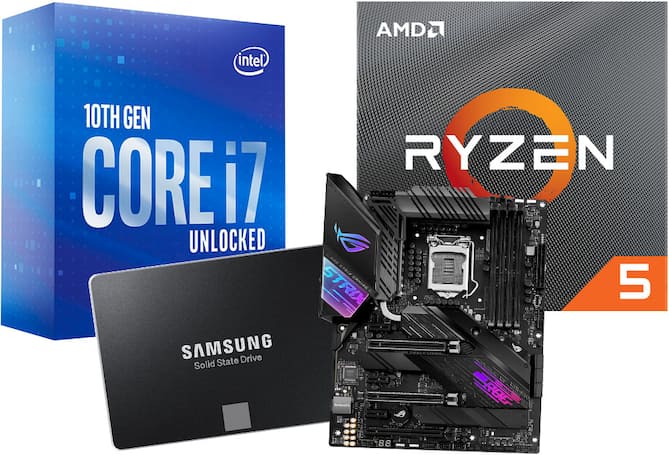What Are the Different Types of Computer Processors?

If you're in the market for a new desktop computer or laptop, you've probably noticed that there are a lot of processor options out there. But with all the different specifications and models, it might be hard to know which processor is best for your needs.
Fortunately, knowing more about computer processors can help you be an informed shopper, reducing your confusion and frustration. Keep reading to learn how processors work, what the latest models have to offer and how to narrow down your options when you are ready to buy.
What is a computer processor?
A computer processing unit (CPU) is the "brain" of any computer, handling all the instructions that need to be carried out. The CPU has two main parts: the control unit and the arithmetic logic unit. While the control unit is responsible for fetching and decoding instructions, the arithmetic logic unit performs the calculations to complete the given assignment.
The processor also contains several registers which are used to temporarily store data. The speed of the processor is measured in hertz (hz), which is the number of processor instruction sub-steps per second that the CPU can perform. Therefore, a processor with a measurement of 1 hertz can perform one sub-step a second, while a processor with a measurement of 1 gigahertz (Ghz) can perform 1 billion (giga stands for billion) sub-steps in one second.
What is the core in a processor?
The very first processors were single core, but now there are anywhere from two to as many as 16-core CPUs to improve overall speed and functionality. However, having more cores does not always equal a better processor. Each core has what are called “threads,” which refers to the number of things a core can do at once. Therefore, a processor with 6 cores and 12 threads might be better than a model with 8 cores and 8 threads.
There are even high-end desktops with CPUs that have up to 18 cores and 36 threads. These computers are made possible by people who have an affinity for using separate computer components to build their own PC. It’s important to note that the higher the number of cores, the higher the amount of energy needed to operate the computer. Ultimately, the best processor for you depends on your needs and unique interests.
Do the numbers in the name of the processor relate to the number of cores?
The short answer is no. First, you will notice that the processor titles (Intel Core i7, AMD Ryzen 9) all use odd numbers, whereas cores higher than single are offered in even numbers: dual core, quad core, etc. The numbers within the product name refer to that generation of processor’s overall architectural design, not the number of cores or threads within that model. For example, an AMD Ryzen 5 processor could have 4 cores and 8 threads, or 6 cores and 12 threads, depending on the model.
Another point worth mentioning is that just because a new generation of processors hits the market, it doesn’t mean that the predecessors become obsolete. In fact, desktops and laptops with more basic processors are still being made and brought to market.
Are the latest computer processors better?
As with any form of technology, the most recent iterations are almost always an improvement on previous models. Whether that improvement matters to you depends on what activities you are doing on your computer. Brands that make processors seek to improve performance (processing time, energy usage, and graphics quality) with each succeeding generation. But there are also users who will prefer a specific processor for certain tasks even though it is an earlier model.
The latest generation isn’t always what’s best for you, especially if you’re on a tight budget. If you’re not using your Chromebook for high-speed data analysis, PC games, 4K videos, or other complex activities, then a laptop with the latest and most expensive processor is unnecessary. However, if you plan on updating your video graphics card to accommodate your visual hobbies such as making digital art or watching movies, you may need to choose a high-quality CPU that can keep up with your pursuits.
How do I choose the right processor for me?
Earlier generations are sufficient for running business software, surfing the web, streaming movies, or even getting on a virtual call. If you want to utilize graphic design and photography software, watch videos with 4K resolution, or play video games, a later generation processor would be a better option.
For even more specifics on each processor, be sure to read user reviews and recommendations. This information can be especially helpful if you have a certain purpose in mind for your computer. For instance, if you’re an avid gamer looking for a gaming PC, you can scan feedback to learn the exact processor brands and models that other gamers use and love.
As with most purchases, you might need to stay within a certain budget when shopping for a new computer processor. Fortunately, there are models available at several price points so you can choose the right processor for you and your wallet. And with your newfound knowledge of CPUs, you’re ready to make a selection you can feel confident about.